Key takeaways:
- Greek cooking emphasizes simplicity and flavor, connecting meals to cultural traditions and personal memories.
- Key ingredients like olive oil, herbs, and feta cheese are essential for creating authentic Greek dishes.
- Techniques such as slow cooking, grilling, and baking play a crucial role in developing the rich flavors characteristic of Greek cuisine.
- Personal customization of recipes can enhance traditional dishes while preserving their essence, showcasing creativity in the kitchen.
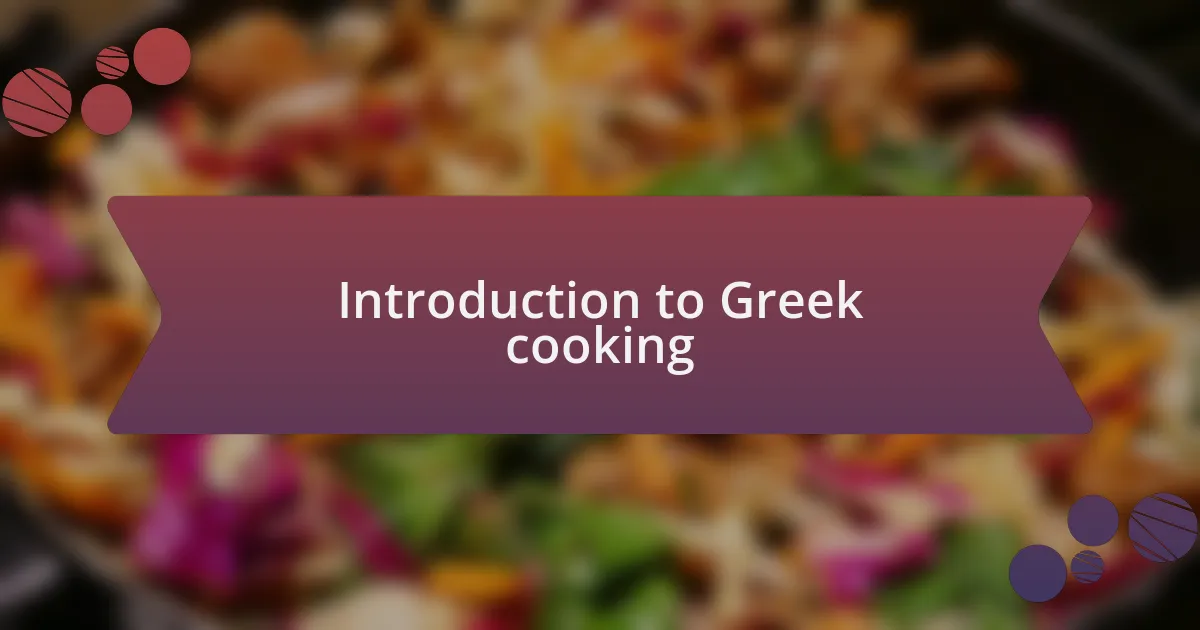
Introduction to Greek cooking
Greek cooking is a beautiful tapestry woven from rich traditions, fresh ingredients, and a deep sense of community. When I think back to my visits to family gatherings, the aroma of roasted lamb mingling with herbs like oregano and thyme still lingers in my memory. It’s not just about the food; it’s about the love and stories shared around the table.
What I find fascinating about this cuisine is its emphasis on simplicity and flavor. Have you ever tried a dish that uses just a handful of ingredients yet bursts with taste? That’s the magic of Greek cooking. It highlights the natural flavors of seasonal produce, whether it’s a ripe tomato or creamy feta, elevating even the simplest meals.
Each dish tells a story, connecting us to the land and its history. I remember savoring homemade moussaka, layered with eggplant and a rich béchamel sauce, while listening to my grandmother recount tales of her village. How do our own meals connect us to tradition, and what stories do we bring to the table? In Greek cooking, every bite is an invitation to explore our roots and celebrate life together.
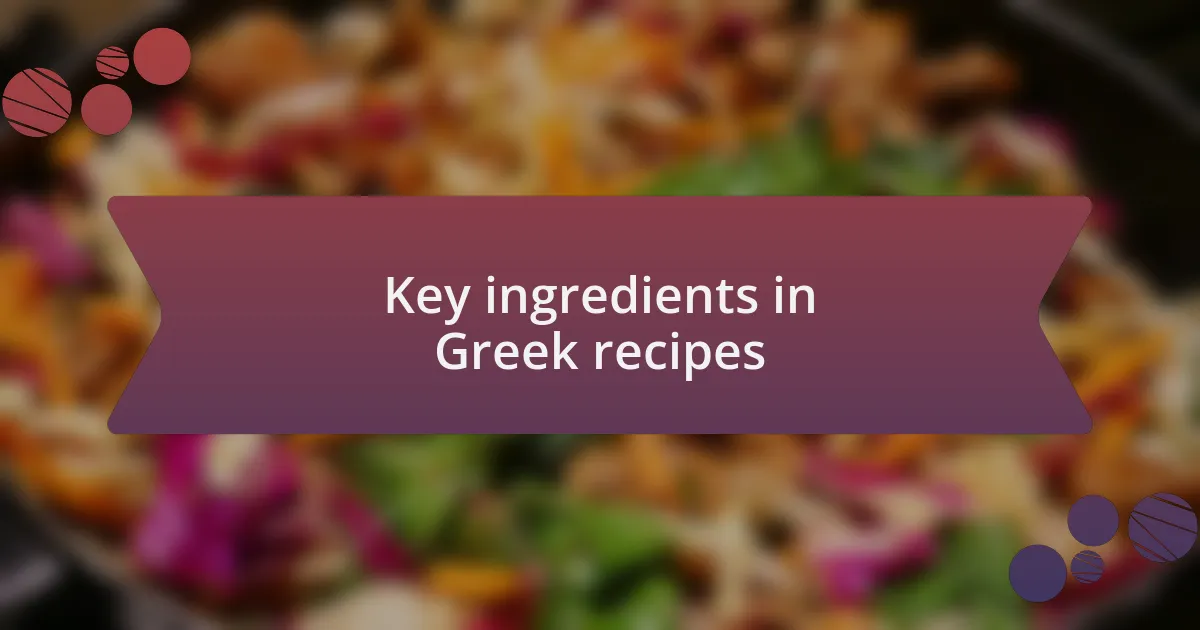
Key ingredients in Greek recipes
When it comes to Greek recipes, a few key ingredients stand out, deeply rooted in the culture and geography of the region. Olive oil is, without doubt, one of the stars of Greek cooking. I still remember my first taste of freshly made Greek salad drizzled with rich, golden olive oil – the way it transformed the vibrant tomatoes and cucumbers into something truly exceptional. Isn’t it amazing how a simple drizzle can elevate flavors to new heights?
Herbs like oregano, thyme, and dill not only add layers of flavor but also evoke fond memories for many of us. I often find myself wandering through markets in Greece, mesmerized by the fragrant displays of dried herbs that remind me of summers spent cooking alongside my mother. Have you ever experienced the power of a fragrance to transport you back in time? That’s what these herbs do for me; they are the essence of Greek home cooking.
Feta cheese is another cornerstone ingredient that brings richness to countless dishes. I’ll never forget the first time I had spanakopita, where the creamy, tangy feta blended with spinach and flaky pastry sent my taste buds into a joyful dance. How can such a humble ingredient elicit such happiness? To me, it embodies the heart of Greek cuisine — simple yet full of flavor and tradition.
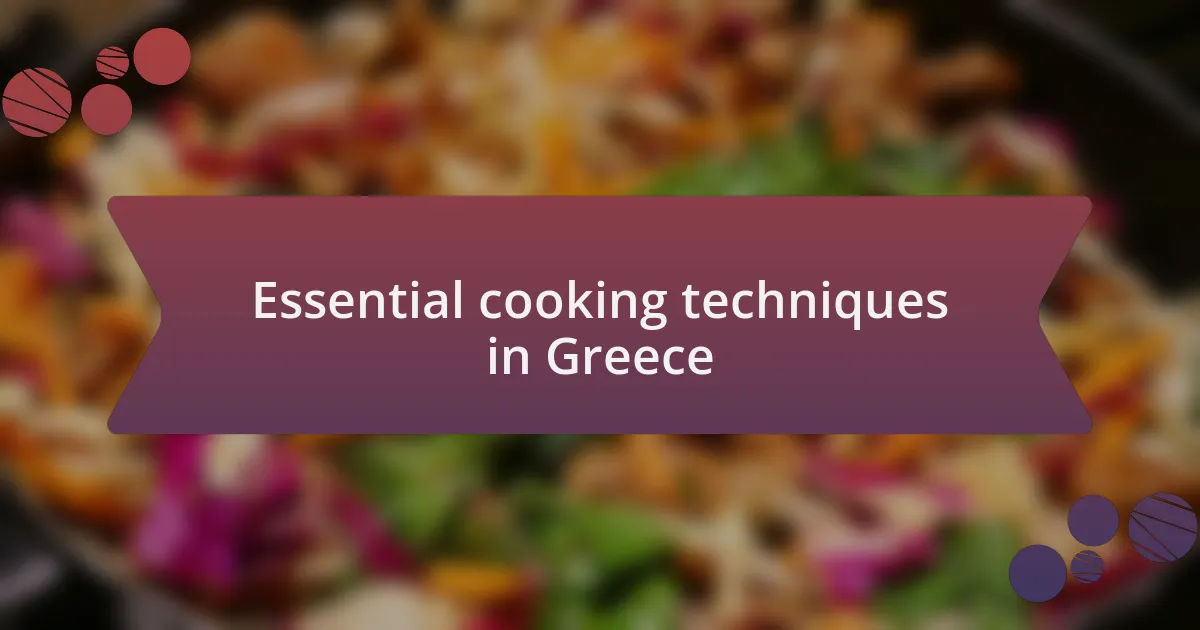
Essential cooking techniques in Greece
The heart of Greek cooking lies in its techniques, which I’ve come to appreciate over numerous family meals. One technique that stands out to me is slow cooking, especially for stews like stifado. I recall the aroma wafting through the house as my grandmother would prepare it; the flavors meld together beautifully, and the tenderness of the meat just melts in your mouth. Isn’t it incredible how patience can transform simple ingredients into something magical?
Grilling is another essential method in Greek cuisine, elevating everything from meats to vegetables. I remember the first time I tried souvlaki; the smoky flavor from the open flame made it unforgettable. There’s something about cooking over charcoal that adds an element of rustic charm to a gathering, don’t you think? Each bite reminds me of warm summer evenings spent with friends, laughter mingling with the scent of grilled lamb.
Of course, baking has its own special place in Greek cooking, particularly in the preparation of bread and pastries. I can still vividly recall the excitement I felt when I helped my mother knead dough for a batch of tsoureki. The sweet, fragrant bread would fill our home with warmth and comfort. How can something as simple as bread create such a sense of belonging? For me, these techniques weave together the fabric of Greek culinary tradition, turning routine meals into cherished memories.

My favorite Greek dishes
When I think of my favorite Greek dishes, moussaka immediately comes to mind. The first time I savored this layered masterpiece, I was at a family gathering. The rich combination of eggplant, hearty ground meat, and creamy béchamel sauce made my taste buds dance. Who knew that such a seemingly simple dish could pack a punch of flavors that leave a lasting impression?
Another dish I absolutely adore is spanakopita. I recall the first time I attempted to make it myself; the kitchen was filled with the enticing aroma of sautéed spinach and feta wrapped in crispy phyllo dough. While it wasn’t perfect, the satisfaction of biting into that flaky goodness was unmatched. Doesn’t it seem amazing how such a dish can bring back memories of laughter and joy shared over dinner tables?
Of course, I can’t forget about dolmades. Just the thought of those grape leaves stuffed with a savory mixture of rice and herbs sends me back to sunny afternoons spent gathering with my family. There’s a certain comfort in dipping them in a tangy lemon sauce, creating a perfect balance of flavors. Isn’t it remarkable how food has the power to evoke such rich memories and connect us to our roots?
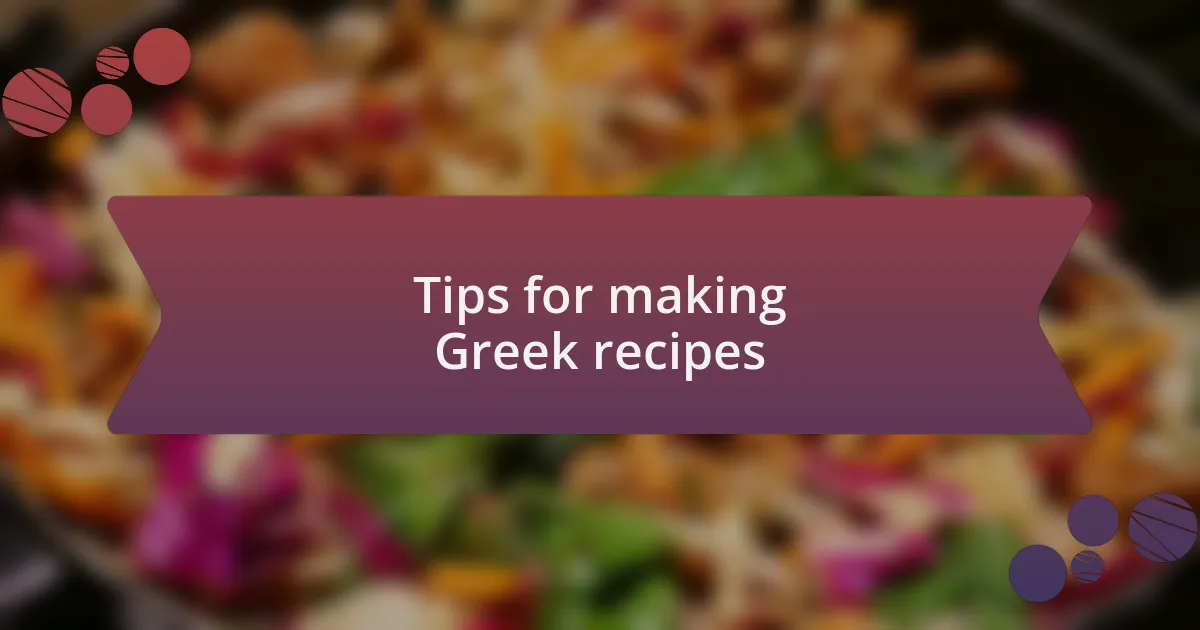
Tips for making Greek recipes
When it comes to making Greek recipes, one of the most important tips I can share is to use quality ingredients. For instance, I remember my first attempt at making tzatziki; I skimped on the yogurt and used a low-fat option. The result? A watery dip that lacked the creamy richness I had expected. Using authentic Greek yogurt made all the difference when I tried again, resulting in a flavorful condiment that elevated the entire meal.
Another essential tip I’ve found is to embrace traditional cooking methods. I learned this firsthand while making a slow-cooked lamb dish. The recipe recommended low heat for several hours. I was tempted to rush it, but after following the directions, I experienced melt-in-your-mouth meat infused with fragrant herbs. It’s a reminder that sometimes, patience in cooking can yield rewards that fast methods simply can’t match.
Don’t underestimate the power of seasoning! In my early days of Greek cooking, I tended to under-season. It wasn’t until a friend pointed out that a little more garlic and dill transformed my roasted vegetables from bland to bursting with flavor. Have you noticed how seasoning can bring a dish to life? I’ve learned that it’s often the small adjustments that make the biggest impact on your culinary creations.
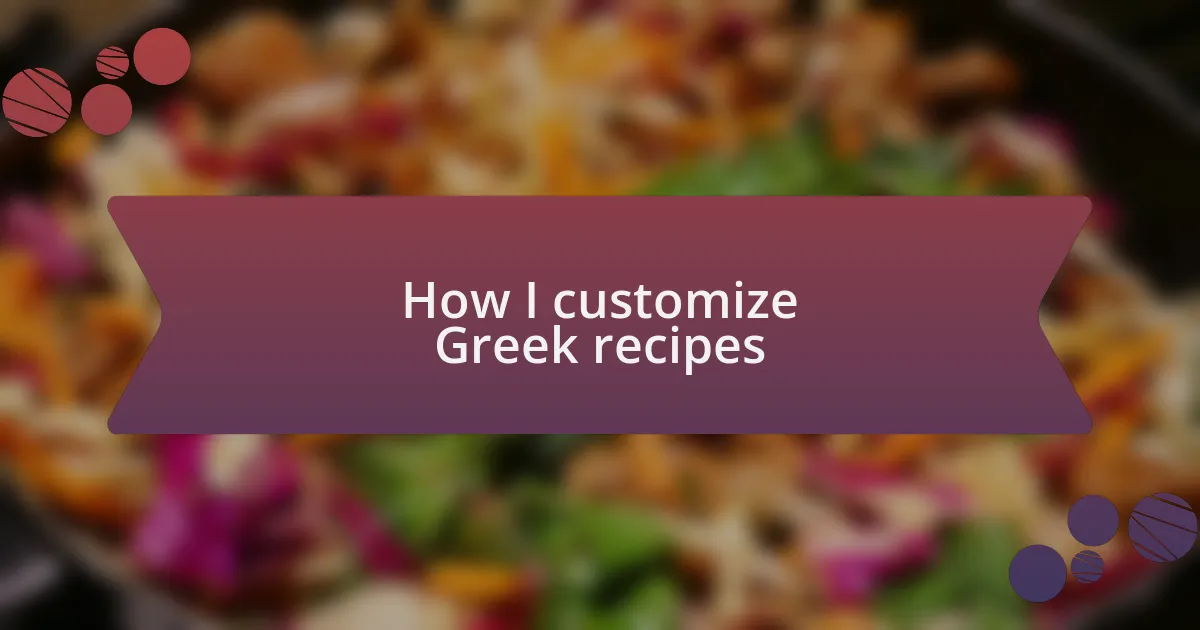
How I customize Greek recipes
I love putting my own twist on traditional Greek recipes, particularly when it comes to flavor. For example, I often experiment with different types of herbs. The first time I added fresh basil to my spanakopita, I was surprised by how it brightened the dish! It brought out a fresh flavor that complemented the spinach perfectly. Have you ever thought about how simple changes can lead to delightful surprises in cooking?
When making moussaka, I sometimes swap traditional ground beef for a mix of lentils and mushrooms. This not only adds a depth of flavor but also makes the dish vegetarian-friendly. The first time I served it to friends, they were blown away by how hearty and satisfying it was. I felt proud to show that you can maintain the essence of a classic while catering to different dietary needs.
I’ve also learned to play with the textural elements of Greek dishes. For instance, I like to top my Greek salad with crunchy walnuts for an unexpected twist. The first time I tried this, the contrast between the crisp vegetables and the nutty crunch created a lovely harmony of textures that made each bite exciting. Isn’t it fascinating how a small addition can elevate a familiar dish into something new?
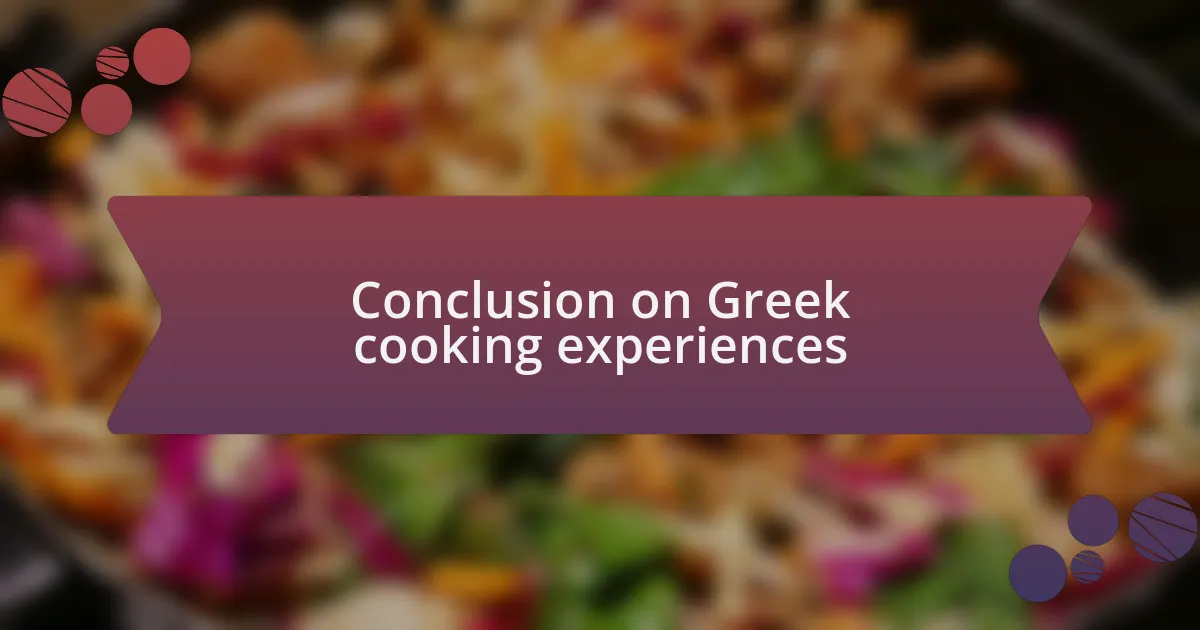
Conclusion on Greek cooking experiences
Greek cooking experiences have truly shaped my culinary journey in profound ways. I remember one cozy evening spent sharing a homemade feast with friends, where we laughed over plates of tzatziki and stuffed grape leaves. The joy on their faces as they savored each bite was a reminder of how food can forge connections and create lasting memories.
As I reflect on my experiments in Greek cuisine, I realize that the process is not just about following recipes; it’s about embracing the spirit of creativity and adventure in the kitchen. Each unique substitution or spin I’ve made transformed not just the dish but also my relationship with cooking. Have you ever felt that exhilarating thrill when a dish turns out better than you imagined?
Ultimately, every meal I’ve crafted has been a blend of tradition and personal flair, reflecting my growth as a cook. Each experience has taught me that while we may honor cultural heritage, it’s our personal touch that brings recipes to life. I invite you to explore your culinary experiments and discover the joy that comes from experimenting with flavors, just as I have found.